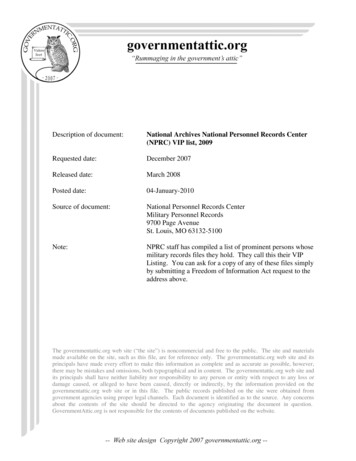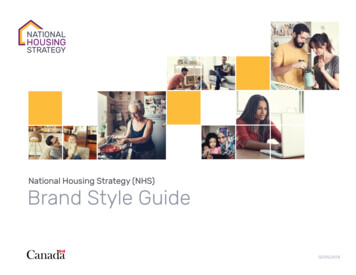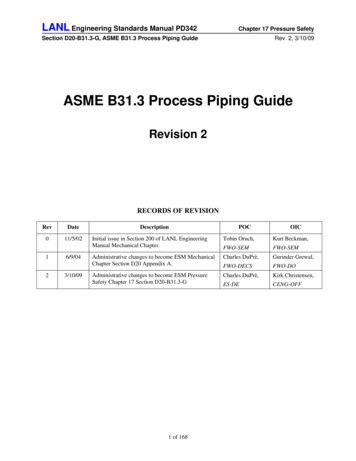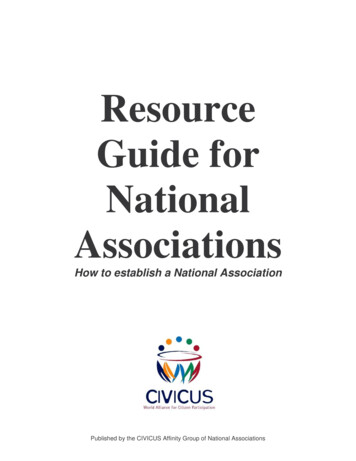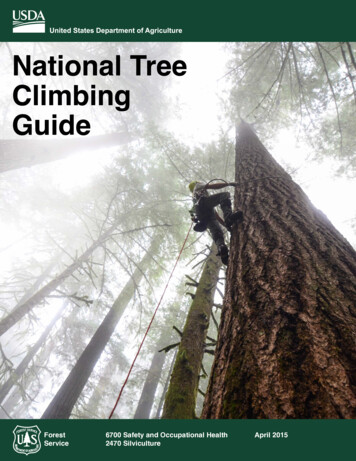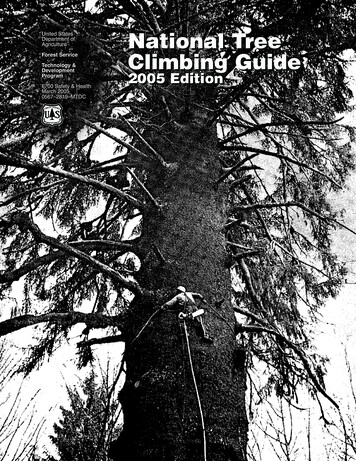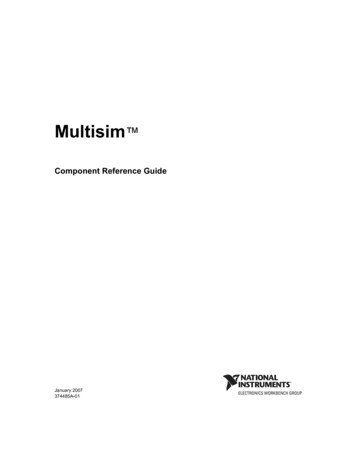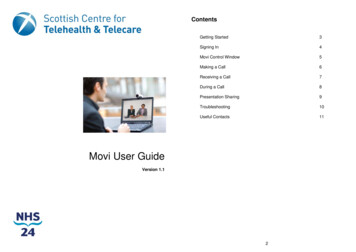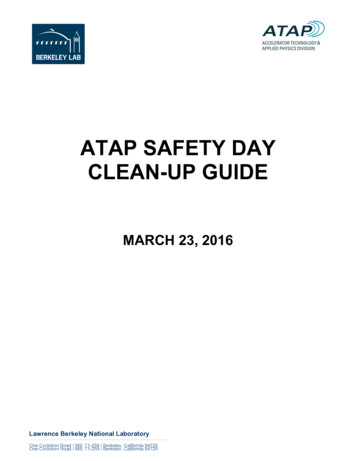
Transcription
November 2014Guide to theNEBOSH NationalCertificate inConstruction Healthand Safety
Qualification title: NEBOSH National Certificate in Construction Health and SafetyVersion: 9Specification date: November 2014Guide publication date: November 2018The National Examination Board in Occupational Safety and Health (NEBOSH),Dominus Way, Meridian Business Park, Leicester LE19 1QW.Registered Charity Number: 1010444Telephone:Fax:Email:Website: 44 (0) 116 263 4700 44 (0) 116 282 4000info@nebosh.org.ukwww.nebosh.org.uk NEBOSHAll rights reserved. No part of this publication may be reproduced, stored in a retrieval system ortransmitted in any form, or by any means, electronic, electrostatic, mechanical, photocopied orotherwise, without the express permission in writing from NEBOSH. NEBOSH 2019
Guide to the NEBOSH National Certificate in ConstructionHealth and Safety (November 2014 specification)Contents1. 21.131.141.151.161.171.181.19Benefits for employersProfessional membershipQualification level and UK accreditationKey topics coveredCourse tuition and private study time requirementsEntry requirementsMinimum standard of English required for candidatesLanguagesLegislationLegislative updatesNational Occupational Standards (NOS) and best practiceQualification typeQualification progressionProgrammes offered by NEBOSH-accredited course providersExamination datesSpecification dateSyllabus development and reviewFurther information for candidatesFurther information for accredited course providers12223333444455556662. Qualification structure2.12.22.32.42.52.62.72.8Unit assessmentUnit exemptionsAchieving the qualificationUnit pass standardsUnit certificatesQualification gradeQualification parchmentRe-sitting unit/s788888893. Policies3.13.23.33.4Requests for access arrangements/reasonable adjustmentsRequests for special considerationEnquiries about results and appealsMalpractice NEBOSH 201910101011
4. Notes for tutors4.14.24.34.4Tutor referencesTeaching of unitsConflict of interestMinimum standard of English required for tutors5. Syllabus - NEBOSH National Certificate in Construction Health and Safety(November 2014 specification)12121212135.1 Unit NGC1: Management of health and safetyElement 1:Foundations in health and safetyElement 2:Health and safety management systems – PlanElement 3:Health and safety management systems - DoElement 4:Health and safety management systems – CheckElement 5:Health and safety management systems – ActUnit NGC1: Tutor References5.2 Unit NCC1:Managing and controlling hazards in construction activitiesElement 1:Construction law and managementElement 2:Construction site - hazards and risk controlElement 3:Vehicle and plant movement - hazards and risk controlElement 4:Musculoskeletal hazards and risk controlElement 5:Work equipment - hazards and risk controlElement 6:Electrical safetyElement 7:Fire safetyElement 8:Chemical and biological health - hazards and risk controlElement 9:Physical and psychological health - hazards and risk controlElement 10: Working at height - hazards and risk controlElement 11: Excavation work and confined spaces - hazards and risk controlElement 12: Demolition and deconstruction - hazards and risk controlUnit NCC1: Tutor References5.3 Unit 434547495254565860Construction health and safety practical applicationPurpose and aimAssessment locationAssessment requirementsSubmission of completed workFurther information66676768686. Sample examination question papers6.16.2Unit NGC1: Management of health and safetyUnit NCC1: Managing and controlling hazards in construction activities NEBOSH 20196972
The Guide to the NEBOSH National Certificate in ConstructionHealth and Safety (November 2014 specification)1.IntroductionThe NEBOSH National Certificate in Construction Health and Safety has been offered since1989 and is established as a leading health and safety qualification for the constructionindustry, with over 15000 successful candidates.The National Construction Certificate is designed for supervisors and managers within theconstruction industry and is designed to provide a sound breadth of underpinning knowledgethat enables them to discharge more effectively their duties with respect to health and safetyin construction activities.1.1Benefits for employersAccidents and work-related ill-health affect all types of workplaces and occupations.However, the Health and Safety Executive (HSE) reported that the construction industrysuffered the largest amounts of fatal injuries of all sectors in 2013/14. Of the 133 workerskilled during 2013/14 nearly a third (42) worked in the construction industry. During 2013/14there were a total of 77593 RIDDOR reportable injuries reported to the HSE. Relative to otherindustries, a higher proportion of reported injuries were caused by falls from height, fallingobjects, contact with moving machinery, collapses/overturns and electricity. These statisticsare in addition to the thousands of construction workers and ex-construction workers who dieannually from mesothelioma (a total of 2535 deaths for 2013/14) and other occupationalcancers and work-related lung diseases. An estimated 2.3 million working days (1.7 millionfor ill-health and 592000 due to workplace injury) were lost in 2013/14 in the constructionindustry ction/index.htm).In addition to the direct costs of sick pay and absence, employers can find themselves dealingwith criminal prosecution (there were a total of 674 prosecutions in the UK during 2013/14),claims for compensation, adverse publicity and harm to both business reputation andprofitability. The country’s annual sick pay bill (for ill health and injury) is estimated at 14.2billion in 2012/13 .pdf).The vast majority of occupational injuries, incidents and ill-health are avoidable by good healthand safety management. By saving money, improving productivity and raising workforcemorale, effective health and safety management should be recognised as an essentialelement of a successful management strategy.Many larger construction organisations choose the NEBOSH National Construction Certificateas a key part of their supervisors’ or management development programme. By ensuring thatline managers have a sound understanding of the principles of risk management they build aneffective safety culture in the company. Smaller construction organisations often choose theNEBOSH National Construction Certificate as the appropriate qualification for the managertaking the lead on health and safety issues.This course can be delivered within an organisation, or employees can attend accreditedtraining courses run throughout the UK by our network of accredited course providers.NEBOSH accredited course providers offer a variety of flexible course formats, so training canbe arranged according to employer needs. NEBOSH 20191
The Guide to the NEBOSH National Certificate in ConstructionHealth and Safety (November 2014 specification)1.2Professional membershipHolders of NEBOSH National Certificate in Construction Health and Safety are entitled toAssociate Membership (AIOSH) of the Institution of Occupational Safety and Health (IOSH).The qualification also meets the academic requirements for Technical membership (TechIOSH) of the Institute of Occupational Safety and Health (IOSH – www.iosh.co.uk) andAssociate membership (AIIRSM) of the International Institute of Risk and Safety Management(IIRSM – www.iirsm.org).The NEBOSH National Certificate in Construction Health and Safety meets the headlineentrance criteria requirements for Construction Safety Associate membership (AaPS) of theAssociation for Project Safety (APS - www.aps.org.uk).Holders of both the NEBOSH International or National Diploma in Occupational Health andSafety and the NEBOSH National or International Certificate in Construction Health and Safetymeet the headline entrance criteria requirements for Registered Construction SafetyPractitioner (RMaPS) membership of the Association for Project Safety (APS www.aps.org.uk).Holders of this qualification are also entitled to Associate membership (AIIRSM) of theInternational Institute of Risk and Safety Management (IIRSM – www.iirsm.org).1.3Qualification level and UK accreditationThe NEBOSH National Construction Certificate is accredited and credit rated by the ScottishQualifications Authority (SQA - www.sqa.org.uk) for delivery across the UK. It is rated withinthe Scottish Credit and Qualifications Framework (SCQF - www.scqf.org.uk) at SCQF Level 6with 17 SCQF credit points.For users in England, Wales and Northern Ireland, this is comparable to a VocationallyRelated Qualification (VRQ) at Level 3 within the National Qualifications Framework (NQF)and Qualifications and Credit Framework (QCF), or A-Level standard.For further information please refer to the “Qualifications can cross boundaries” comparisonchart issued by the UK regulators, available from the SQA website (www.sqa.org.uk).1.4Key topics covered Legal requirements for health and safety at work Implementation of health and safety management systems Identification of construction workplace hazards Methods of construction hazard control Practical application of knowledge and understanding NEBOSH 20192
The Guide to the NEBOSH National Certificate in ConstructionHealth and Safety (November 2014 specification)1.5Course tuition and private study time requirementsUnit NGC1:Unit NCC1:Unit NCC2:36 hours tuition and 23 hours private study68 hours tuition and 29 hours private study2 hours tuition and 6 hours private studyTotal: 59 hoursTotal: 97 hoursTotal: 8 hoursA programme of study therefore needs to be based around a minimum of 106 taught hoursand approximately 58 hours of private study for an overall total of 164 Hours.A full-time block release course would be expected to last for a minimum of three weeks(fifteen working days) and a part-time day release course would be spread over at least fifteenweeks. For candidates studying by open or distance learning, the tuition hours should beadded to the recommended private study hours to give the minimum number of hours that thismode of study will require.Quoted hours do not include assessment time, ie, sitting written examinations or the practicalapplication unit (see 1.6).1.6Entry requirementsThere are no specific barriers, in terms of academic qualifications, skills or experience to entryto the NEBOSH National Construction Certificate programme. However, it should be notedthat currently the assessments are offered, and must be answered, in English only. Thequalification includes a requirement to write a short report based on the candidate’s ownworkplace, which must also be in English. Candidates should discuss this with the accreditedcourse provider before undertaking the qualification.1.7Minimum standard of English required for candidatesThe standard of English required by candidates studying for the NEBOSH NationalConstruction Certificate must be such that they can both understand and articulate theconcepts contained in the syllabus. It is important to stress that the onus is on accreditedcourse providers to determine their candidates’ standards of proficiency in English.NEBOSH recommends to accredited course providers that candidates undertaking thisqualification should reach a minimum standard of English equivalent to an InternationalEnglish Language Testing System score of 6.0 or higher in IELTS tests in order to be acceptedonto a National Construction Certificate programme.For further information please see the latest version of the IELTS Handbook or consult theIELTS website: http://www.ielts.org/institutions/test format and results.aspx.Candidates wishing to assess their own language expertise may consult the IELTS websitefor information on taking the test: http://www.ielts.org/faqs.aspx.1.8LanguagesAll unit examinations and the practical assessment must be taken in English. NEBOSH 20193
The Guide to the NEBOSH National Certificate in ConstructionHealth and Safety (November 2014 specification)1.9LegislationThe syllabus refers to UK legislation. Where the syllabus refers to the legislative system ofEngland and Wales, candidates may refer to the legislative systems and requirements thatapply in Scotland or Northern Ireland, provided that these references are clearly indicated assuch.If this qualification is delivered overseas, accredited course providers may refer to examplesof local legislation as part of the course programme but examination questions will refer to UKlegislation only.1.10 Legislative updatesRelevant new legislation will become examinable in detail six months after its date ofintroduction. However, candidates will be expected to be essentially up-to-date at the time ofthe examination and, whilst a detailed knowledge will not be expected, reference to new orimpending legislation, where relevant to an examination question, will be given credit.Please note, NEBOSH will not ask questions related to legislation that has been repealed,revoked or otherwise superseded.NB: Accredited course providers are expected to ensure their course notes remain currentwith regard to new legislation.1.11 National Occupational Standards (NOS) and best practiceThe syllabus is mapped to the relevant National Occupational Standards (NOS): NOS for Health and Safety (Standalone units) published by Proskills Sector Skills Council NOS to Manage health, safety, welfare and environmental factors published byConstructionskills SSC.The mapping of the syllabus units to each NOS can be found on pages 12-13.1.12 Qualification typeNEBOSH qualifications are categorised as 'Other’ qualifications by SQA Accreditation inScotland. These are categorised as Vocationally-Related Qualifications (VRQs) in England,Wales and Northern Ireland.VRQs provide the knowledge and practical
The National Construction Certificate is designed for supervisors and managers within the construction industry and is designed to provide a sound breadth of underpinning knowledge that enables them to discharge more effectively their duties with respect to health and safety in construction activities. 1.1 Benefits for employers

